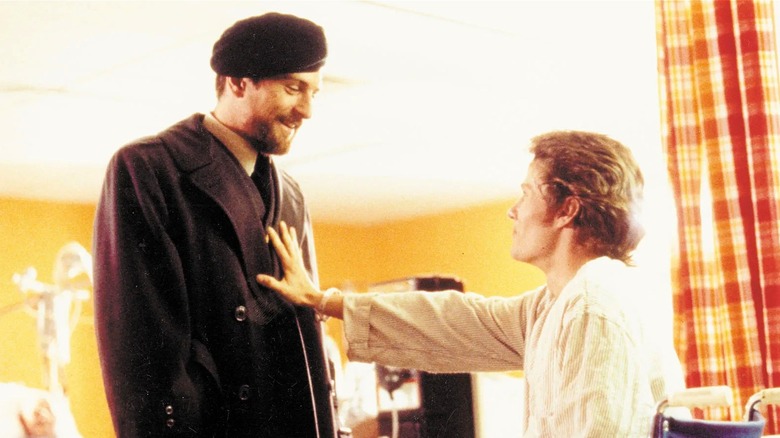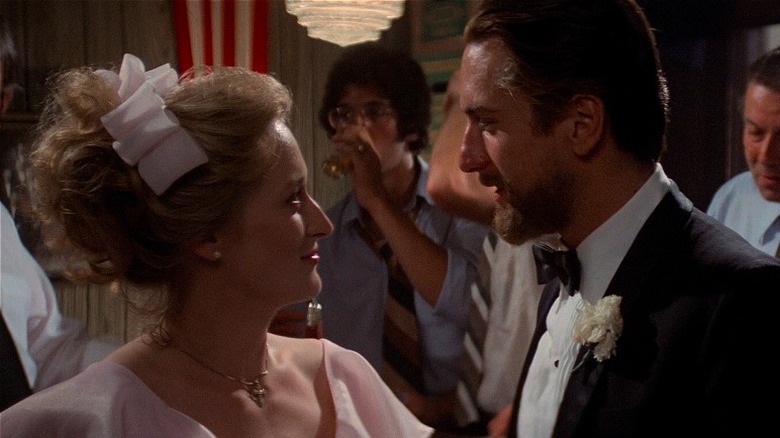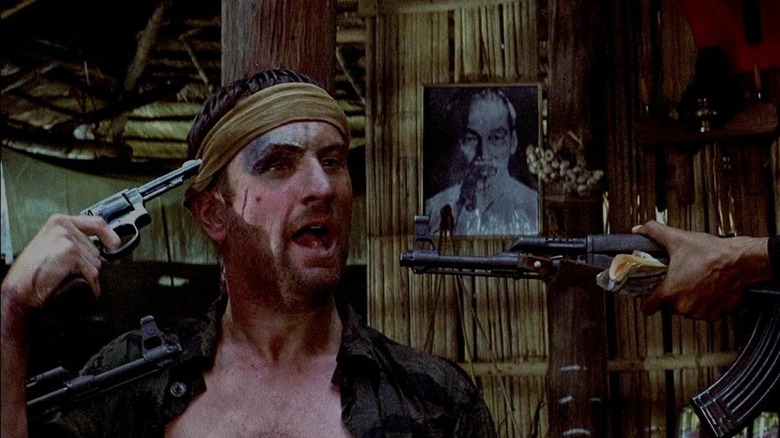Director Michael Cimino Didn't Want The Deer Hunter To Feel Like A Political Statement About Vietnam
In a 1977 New York Times article, director Michael Cimino was asked how big of a role the Vietnam war would play in "The Deer Hunter." He replied, "The war is really incidental to the development of the characters and their story. It's a part of their lives and just that, nothing more. I have no interest in making a 'Vietnam' film, no interest in making a direct political statement."
Released the same year, Francis Ford Coppola's "Apocalypse Now" contemplates the moral ramifications of war whereas "The Deer Hunter" considers how it affects the homefront. "The Deer Hunter" is the story of a group of friends — Michael, Nick, and Steven — that belong to a tight-knit Russian Orthodox community in rural Pennsylvania. With the exception of the infamous Russian roulette scenes, the film focuses on their struggle to assimilate into their community and reconcile their trauma after participating in the Vietnam war.
At the time of "The Deer Hunter" release, American films mostly avoided the subject of the Vietnam war, which had only ended a few years ago. Why would audiences want to watch the horrors of combat at the movies after seeing them on their television screens every night? Some films, like the conservative John Wayne vehicle "The Green Berets," tried to galvanize Americans, while others such as "The Visitors" and "The Losers" stoked the public's vitriol of Vietnam veterans.
"The Deer Hunter" foreshadows a trend in 1980s movies — such as "In Country" or other Robert De Niro feature "Jacknife" — that explores veterans returning home to deal with post-traumatic stress and their families trying to understand them. These films do not interrogate the political morality of the war.
Community and friendship are more important
Michael Cimino elaborates on the domestic perspective of "The Deer Hunter" in the aforementioned New York Times interview:
"I really wanted to make a film about these kinds of people (middle American steelworkers in a Slovak community). Like most ordinary people, they can be quite extraordinary in the face of crises. So the war is simply a means of testing their courage and willpower. But it could just as easily have been the Civil war."
The characters' environment is very important to "The Deer Hunter," and one of the ways Cimino establishes this is through the lengthy and elaborate wedding sequence that opens the film. We recognize how close everyone in the blue-collar town is as they dance, drink, flirt, shout, and laugh together. Seeing how loved and supported the main characters are in their community, and the neighborly warmth and American pride that motivate them, make the isolation and suffering they endure when returning home even more painful.
The war scenes feel more like a fairy tale than an accurate depiction of combat. Cimino purposefully ignores historical truth and depicts the Vietnam conflict with a harmful good versus evil dynamic to heighten the film's emotional drama. Despite being in different branches of the military, the trio magically reunites in a Vietnamese village. From there, they are captured by the Viet Cong and kept in cages surrounded by rats and dead bodies. They are forced to play a game of Russian roulette with live ammunition, and their vicious enemy enjoys terrifying them.
The dangers of depoliticizing 'The Deer Hunter'
Although Cimino insists that Vietnam is inconsequential to the overall narrative, the highly-charged Russian roulette scenes have damning political connotations. "The Deer Hunter" was met with controversy because Cimino portrays the Vietnamese people as cruel and sadistic villains who torture Americans for fun. Many veterans and war researchers protested the fabricated scenes of the brutal game.
"The Deer Hunter" was not an accurate portrayal of war, but rather a melodramatic fantasy that unfairly framed the Vietnamese as pure evil. By painting the enemy in broad strokes, Cimino does not question why the war is being fought in the first place, and why so many Americans were against it. Hal Ashby's "Coming Home," released in 1977, tackles such difficult questions, especially in the final scene when a veteran warns a group of high school students about the dangers of nationalism and cowboy notions of masculinity — exactly the kind of values that the community in "The Deer Hunter" supports.
"The Deer Hunter" distances itself from any such issues. As The New York Times reminds us, "this is not the sort of film in which the war will provide a symbol for the unraveling of America's moral fibre. No chic nihilism or even nay saying for Cimino." Cimino's film does not ponder the hows and whys of the Vietnam war; it studies how Michael, Nick, and Steven fight for survival. The core of "The Deer Hunter" is friendship, and how enduring something horrifying changes your life and perception of the world forever.


